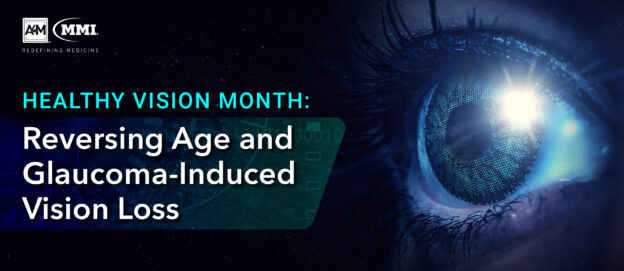July marks the beginning of Healthy Vision Month, an awareness initiative led by the National Eye Institute that aims to spotlight the importance of eye health and protection throughout the aging process. As the current scientific understanding of aging expands, so does the knowledge of potential underlying mechanisms that contribute to physical and cognitive degeneration.
One proposed cause of aging is the accumulation of epigenetic noise – or disruptions in gene expression patterns – that lead to decreased tissue function and reduced regenerative abilities. In a recent study, researchers from the Harvard Medical School (HMS) addressed the epigenetics-based theory of aging which postulates that changes in the epigenome cause cellular malfunctions and age-related diseases over time.
Their research continues to explore whether DNA methylation drives cellular change and whether restoring functionality in living organisms is possible. Results report restored vision in mice achieved by restoring aged cells in the retina to their youthful function and a reversal of vision loss in mice with a condition mimicking human glaucoma.
Epigenetic Reprogramming in Mice
The proof-of-concept study represents the first successful attempt at reversing the biological clock in animals via epigenetic reprogramming. To prove this, the team of researchers examined the potential of reversing the age of cells by controlling DNA methylation.
Led by Yuancheng Lu, research fellow at Harvard Medical School, the study’s authors examined whether the regenerative capacity of young animals can be replicated in adult mice by delivering a modified three-gene combination via an adeno-associated virus (AAV) into the retinal ganglion cells of adult mice with optic nerve injury. They targeted cells within the central nervous system as it is the first part of the body affected by aging.
“Having previously found evidence for epigenetic noise as an underlying cause of aging, we wondered whether mammalian cells might retain a faithful copy of epigenetic information from earlier in life that could serve as instructions to reverse aging,” the research team commented.
Restoring Eyesight and Rejuvenating Cells
Lu and colleagues found that the treatment had multiple beneficial effects on the eye health of mice; it promoted nerve regeneration following optic nerve injury in mice with damaged optic nerves, caused a two-fold increase in the number of surviving retinal ganglion cells after injury, and increased nerve regrowth by five times. These results suggested that the modified gene combination approach was safe and could potentially be used to revolutionize the treatment of ocular degeneration as well as that of other organs affected by aging.
Following their promising findings, Lu and his team partnered with colleagues at Schepens Eye Research Institute of Massachusetts to perform two experiments: one testing whether the three-gene cocktail could restore glaucoma-related vision loss and a second one to test whether this approach could reverse vision loss associated with the regular biological aging process.
The team found that the treatment led to increased nerve cell electrical activity as well as a notable increase in visual acuity, which was measured by the animals’ ability to see moving vertical lines across a screen in a model of glaucoma. “To our knowledge, this is the first example of vision-loss reversal after glaucomatous injury has occurred; previous attempts have focused on neuroprotection delivered at an early stage to prevent further disease progression,” the authors wrote.
Similarly, the treatment had beneficial effects on the vision of elderly mice; it was able to restore vision in older mice with diminishing vision caused by normal aging. Following the treatment, the researchers found reversed patterns of DNA methylation which suggest that DNA methylation is an active agent in the aging process.
“These data indicate that mammalian tissues retain a record of youthful epigenetic information—encoded in part by DNA methylation—that can be accessed to improve tissue function and promote regeneration in vivo,” the authors concluded.
Clinical Implications
As the first findings that prove the reversal of glaucoma-induced vision loss with no associated negative side effects in the cohort, the latest results will need to be confirmed in further animal work before human trials can be initiated. Nonetheless, the success of the new approach represents a potential breakthrough in regenerative medicine and an array of possible treatment pathways for age-related health conditions.
“Our study demonstrates that it’s possible to safely reverse the age of complex tissues such as the retina and restore its youthful biological function,” said David Sinclair, PhD, co-director of the Paul F. Glenn Center for Biology of Aging Research at HMS, who is senior author of the published paper in Nature. “If affirmed through further studies, these findings could be transformative for the care of age-related vision diseases like glaucoma and to the fields of biology and medical therapeutics for disease at large,” he explained.
Takeaways
If the latest findings can be replicated and validated in future clinical trials, the three-gene combination method could allow for the development of therapies that promote tissue repair across a spectrum of organs and reverse aging and age-related diseases in humans.

